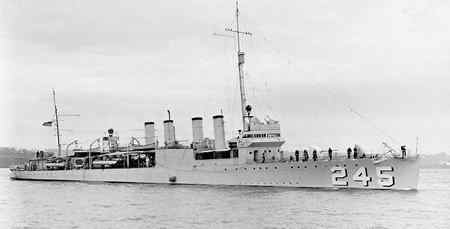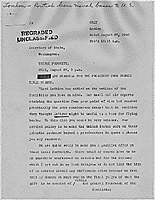Aid to Britain
Prelude to the Lend-Lease Program
The question persisted regarding how America could best aid and bolster Britain. It was obvious that military assistance was impossible. In the end, the arrangement that was worked out was very simple, yet very effective. The beginnings of the program included giving Britain fifty overage destroyers, including the "Reuben James" pictured below, in return for authority to build and operate bases on eight British colonies in the Western Hemisphere. It also included a promise from Churchill that the ships would be sent to defend other areas if Britain was forced to surrender. In two letters on August 27, 1940, Churchill formally offered the the U.S. leases for British bases and FDR offered the destroyers. In the summer of 1940, FDR was searching for ways to sell the American public on aid to Britain. In the way of this plan was a law forbidding the sale of military equipment that was neccesary for defending America. So, FDR needed a way to make the arrangement appear to benefit the U.S. more than keeping the destroyers would. (5)

The "four-piper" USS Reuben James DD-245 of the Clemens class of 1919 from U-Boat Net.
She was torpedoed and sunk by Erich Topp's U-552 on 31 Oct, 194.
FDR decided to make it seem that the U.S. was getting a "good deal" in the arrangement with Britain. Talks regarding the arrangement were conducted during July and most of August. They did not run completely smoothly, but on September 3, FDR took the terms to Congress. Congress passed the appropriations that were neccesary to carry through the agreement without the fuss that FDR had expected. Some said that FDR exceeded his authority with the agreement by avoiding the law and Congress by using an executive agreement to set up the deal. However, the deal was an excellent move for the U.S. to make in 1940. It moved the U.S. towards an alliance with Britain that one year before had not existed. The prime force behind this development was FDR. Public support was behind him, partly because Americans realized that "aid is not involvement, and supplies are not armies." (6) Aid to Britain would continue as the war grew in magnitude.


Letter from
Winston Churchill to Franklin D. Roosevelt
Unrestricted on August 27, 1940 (NLR-MR-FDRWSC-1940-2U) from Nail Database
| >
Table of Contents

